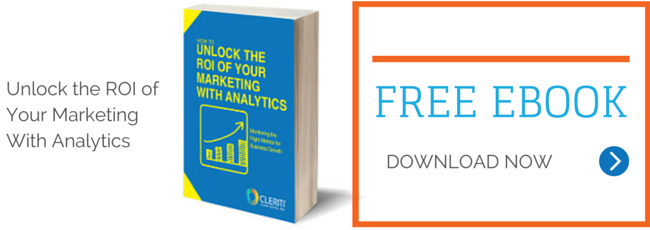- Jun 4, 2014
- By Cleriti Blogger
- In Marketing Strategy and Planning
Digital Marketing Without Tracking Is a Fruitless Endeavor

 Successful marketing campaigns can contain any number of parts, but there’s one aspect that no great marketing project can do without. The ability to track customers, how they respond to your messages, and the interaction between company and customer is crucial in any business. If you don’t keep track of these metrics, there’s no way you can accurately determine your digital marketing ROI, which means you really don’t know if you’re successful.
Successful marketing campaigns can contain any number of parts, but there’s one aspect that no great marketing project can do without. The ability to track customers, how they respond to your messages, and the interaction between company and customer is crucial in any business. If you don’t keep track of these metrics, there’s no way you can accurately determine your digital marketing ROI, which means you really don’t know if you’re successful.
Making Data Work
People commonly cite convenience and reduced costs as the best features of digital marketing. However, the real benefit of digital marketing comes is the endless stream of data that’s produced through your marketing efforts. This data can help you turn good marketing ideas into great campaigns -- if you know what to look for.
You can get data about virtually anything you do that relates to marketing, so much so that it can become overwhelming. There’s something to be said for avoiding the dreaded “paralysis by analysis” syndrome, but if you can pick out the things that really matter, you’ll be much better off.
At minimum, your infrastructure should track the customers who contact you, where they came from, and what made them contact you. Did the customer stumble across your site, or was their interaction a result of a blog on your website? Did your social media platforms encourage customers to take next step? These are questions that you should be able to easily answer.
Connecting the Dots
The more you know about your customers, the better off you’ll be, both as a marketer and as a company. Knowing what makes people tick will help you to give them what they want. The end result is an increased digital marketing ROI and a more engaged customer base.
For example, social media is a popular lead generation machine these days. It’s one thing to know that you get a bunch of hits from your Facebook page. It’s another thing entirely to know exactly what type of posts get people to click on the link to your website. Creating unique landing pages for each of your posts, complete with individualized calls to action and website forms, will give you a better idea of what content moves the needle. And once you have that information, you can ramp up your production of the good stuff, which will give you even further inroads into your target market.
Having the data to understand your customers is the key to everything you do in marketing. It’s the difference between hoping your methods work, and knowing exactly what clicks with your audience.
I Have Data. Now What?
Knowing the story behind your customers helps you in two ways. First, as stated earlier, you have a better understanding of what people want to see from your marketing. Second, and far more importantly, you’ll have a better idea of when you have a potential sale on your hands.
Keeping track of the interactions, and the chain of events that prompted those interactions, is the key to turning a website click into business. Individuals who show initiative in moving forward, such as filling out a form or subscribing for a newsletter, clearly like what you’re doing. It’s those people that you want to target about becoming money-paying customers of your brand. This approach wouldn’t work on someone who’s squarely on the fence. But because you know someone’s got quantifiable interest -- and you’ve got the data to back you up -- you have a much better chance of success.
Bottom Line
Tracking and utilizing data is the most important thing you can do as a marketer. Understanding the data that your methods give you is critical to determining your digital marketing ROI and figuring out where your resources are best allocated. Most of all, data gives you an idea of where people are in terms of becoming customers and how you can best approach these groups of people. The efforts you put into data-driven marketing are reciprocal; as people realize that you know them well, they’ll feel better about your brand, making them more likely to support you in the future.





